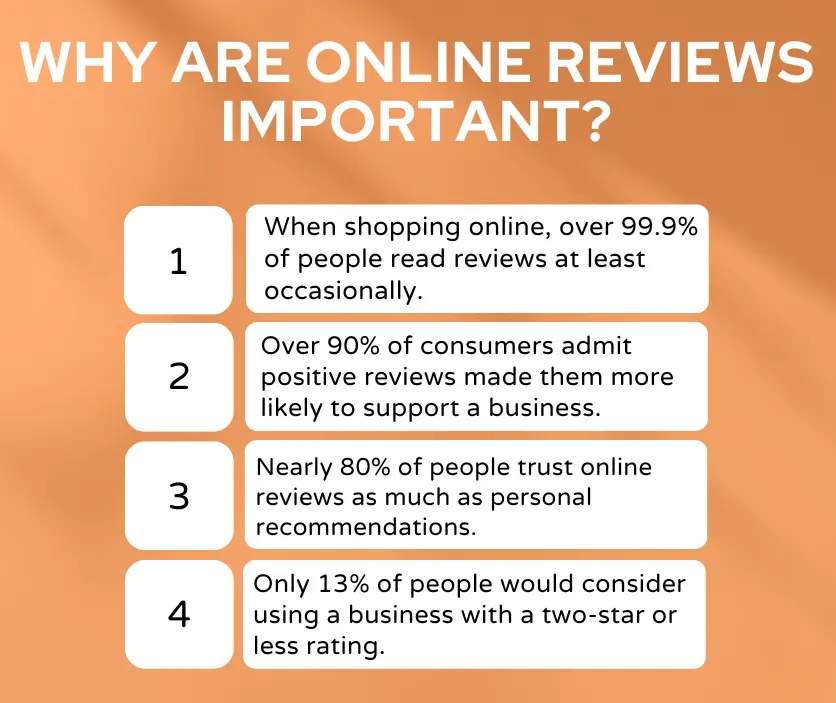Maximizing Online Reviews: Effective Strategies for Your Business

In the digital age, online reviews are the lifeblood of any business, big or small. They not only enhance credibility but also play a crucial role in consumer decision-making. Simply put, they offer genuine, unfiltered perspectives that surpass the reach of any advertising effort.
Online reviews are the contemporary form of word-of-mouth endorsement.
Their impact on a company’s reputation and sales performance cannot be overstated. If there are still questions about the relevance of online reviews for small enterprises, consider these compelling statistics about online reviews:

Here’s a strategic approach to encourage more customers to leave reviews, helping you stand out in a crowded marketplace.
1The Power of Asking:
The simplest yet most effective strategy is to ask your customers directly. This can be done in various ways:
- In-Person Requests: Train your staff to encourage satisfied customers to share their experiences online.
- Digital Prompts: Include review requests in your email signatures, e-receipts, and through follow-up emails or texts after a purchase.
2Automated Email and Text Systems for Review Requests:
Integrating automated systems into your Customer Relationship Management (CRM) software can streamline the process of asking for reviews. Post-purchase or service, automated emails or texts can be sent to customers, inviting them to share their experiences. This approach ensures a consistent and timely request for feedback.
3QR Codes in Physical Mailers:
In an era of digital convenience, QR codes offer a seamless bridge between physical and online interactions. Embedding QR codes in post-engagement letters or postcards can direct customers straight to your review page. This method simplifies the review process, encouraging more customers to participate.
4Social Media Engagement for Reviews:
Social media platforms are powerful tools for gathering and sharing customer reviews. Encourage your followers to leave reviews by creating engaging posts and interacting with your audience. Sharing positive reviews on these platforms can also build social proof and attract new customers.
5Incentivizing Reviews:
While incentivizing reviews can be effective, it’s important to navigate this strategy carefully. Offering rewards for reviews can sometimes lead to biased feedback and may be against the policies of some platforms. Instead, focus on providing excellent service and products, which naturally encourage positive reviews.
6Responding to Reviews:
Engaging with all reviews, whether positive or negative, is crucial.
Thoughtful responses to negative reviews can turn unhappy customers into loyal ones, and acknowledging positive reviews makes customers feel valued. This interaction not only improves customer relationships but also demonstrates to potential customers that you care about feedback.
7Google My Business Features and Updates:
Keep abreast of the latest features in Google My Business, such as new response capabilities or analytics tools. A well-maintained Google My Business profile can enhance your visibility and make it easier for customers to leave reviews.
Conclusion
Incorporating these strategies into your business practices can greatly increase the number and quality of reviews you receive. Remember, each review is an opportunity to showcase your business’s strengths and address any areas for growth. By actively engaging in this process, you can enhance your online presence, build trust with potential customers, and ultimately drive business success.
About the Author

Kevin Bossons
Senior Digital Strategist
With over 15 years of experience in digital marketing and search engine optimization, Kevin has grown from an SEO contractor to Senior Digital Strategist at WT Digital Agency.